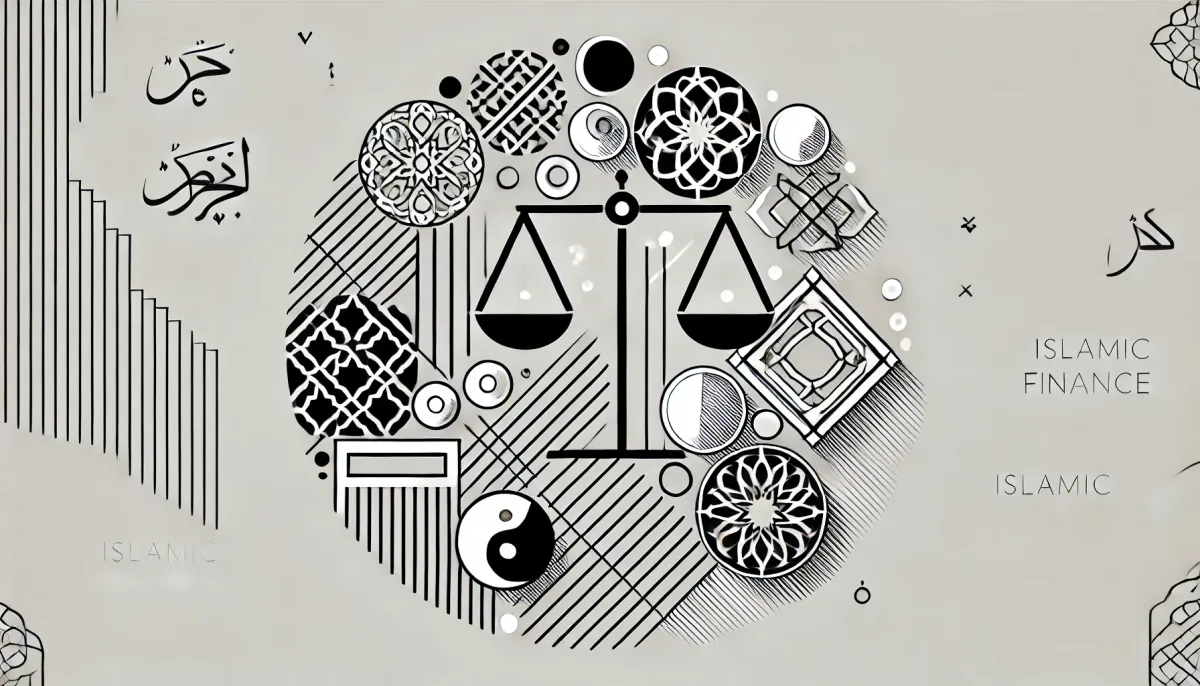Understanding key terminologies is crucial for anyone navigating Islamic finance, whether you're a practitioner, investor, or someone seeking to learn more about Shariah-compliant financial practices. This post provides an overview of essential terms that form the foundation of Islamic finance, focusing on foundational concepts, contractual agreements, and risk management considerations.
1. Foundational Concepts
- Shariah (شريعة): Shariah is the Islamic law derived from the Quran and Hadith, guiding all aspects of Muslim life, including finance. In Islamic finance, adherence to Shariah is paramount, ensuring that all financial transactions are free from elements like interest (Riba), excessive uncertainty (Gharar), and prohibited activities (Haram). Shariah-compliant financial products are designed to align with the ethical and moral principles outlined in Islamic law.
- Riba (ربا): Riba refers to the concept of interest or usury, which is strictly prohibited in Islamic finance. The Quran explicitly forbids the practice of charging interest on loans or any guaranteed increase on borrowed money. Islamic finance promotes risk-sharing and equity-based investments as alternatives to interest-based lending.
- Halal (حلال) and Haram (حرام): Halal means permissible or lawful according to Islamic law, while Haram means forbidden. In Islamic finance, Halal transactions are those that do not involve prohibited activities, such as alcohol, gambling, or interest. Ensuring that financial dealings are Halal is a fundamental requirement in Islamic finance.
- Zakat (زكاة):Zakat is an obligatory form of almsgiving and one of the Five Pillars of Islam. It requires Muslims to donate a portion of their wealth to those in need. In Islamic finance, Zakat is a form of wealth purification and social responsibility, encouraging wealth redistribution and reducing poverty.
- Gharar (غرر): Gharar refers to excessive uncertainty or ambiguity in contracts. Islamic finance prohibits transactions that involve excessive risk or speculation, as these can lead to unfair outcomes. Contracts in Islamic finance must be clear, with well-defined terms and conditions to avoid Gharar.
- Takaful (تكافل): Takaful is the Islamic alternative to conventional insurance, based on mutual cooperation and shared responsibility. In Takaful, participants contribute to a pooled fund, which is used to compensate members in case of loss or damage. Any surplus is distributed among the participants, and the model avoids elements of Riba, Gharar, and gambling.
- Mudarabah (مضاربة): Mudarabah is a partnership where one party provides the capital, and the other offers expertise and management. Profits are shared according to a pre-agreed ratio, while losses are borne solely by the capital provider. Mudarabah is widely used in Islamic investment funds and profit-sharing accounts.
- Musharakah (مشاركة): Musharakah is a joint venture or partnership where all partners contribute capital and share profits and losses in proportion to their investments. This model is often used in Islamic project finance and business partnerships, promoting risk-sharing and joint ownership.
- Ijara (إجارة): Ijara is an Islamic leasing contract where the lessor (owner) leases an asset to the lessee (user) in exchange for rental payments. The ownership of the asset remains with the lessor, and the lessee benefits from its use. Ijara is commonly used in property and equipment leasing and can include a purchase option at the end of the lease term.
- Wakala (وكالة): Wakala is an agency contract where one party (the principal) appoints another party (the agent) to act on their behalf in managing investments or conducting business. The agent receives a fee for their services. Wakala is used in Islamic banking and finance to manage investment accounts, where the bank acts as an agent for the investors.
2. Contractual Agreements and Investment Vehicles
- Murabaha (مرابحة): Murabaha is a cost-plus financing contract where the seller discloses the cost of the asset and adds a profit margin, which is agreed upon by both parties. The buyer pays for the asset either in installments or as a lump sum. Murabaha is commonly used in Islamic home financing, trade finance, and car loans, providing a Shariah-compliant alternative to interest-based loans.
- Istisna (استصناع): Istisna is a contract for commissioned manufacturing or construction, where the buyer orders a specific product to be manufactured or constructed according to agreed-upon specifications. Payment is typically made in stages as the work progresses. Istisna is widely used in construction and infrastructure projects within Islamic finance.
- Salam (سلام): Salam is a forward contract where the buyer pays the full purchase price in advance for goods that will be delivered at a future date. This type of contract is often used in agricultural finance, where farmers receive upfront payment for their crops, which they deliver at harvest. Salam helps provide liquidity to producers and reduces the need for interest-bearing loans.
- Sukuk (صكوك): Sukuk are Islamic bonds that represent ownership in an asset or a pool of assets. Unlike conventional bonds, Sukuk do not involve interest payments. Instead, Sukuk holders receive returns based on the performance of the underlying assets. Sukuk are used to finance large-scale projects, infrastructure, and government spending while ensuring compliance with Shariah principles.
- Qard al-Hasan (قرض الحسن): Qard al-Hasan is an interest-free loan extended as a form of benevolence. The borrower is only required to repay the principal amount, and any extra payment is considered a gift or charity. Qard al-Hasan is used for social welfare, helping those in need without placing a financial burden on them.
- Hawala (حوالة): Hawala is an informal value transfer system used for transferring money without physically moving it. It operates through a network of brokers, relying on trust and mutual obligations. Hawala is commonly used for remittances and international trade, particularly in regions where formal banking is less accessible.
- Bai’ al-Inah (بيع العينة): Bai’ al-Inah is a sale and buyback agreement where one party sells an asset to another for immediate payment and then buys it back at a deferred price. This contract is controversial because it can resemble an interest-bearing loan, and its permissibility varies by region. It is used in some Islamic finance markets as a means of liquidity management.
- Bai’ Bithaman Ajil (BBA) (بيع بالثمن الآجل): BBA is a deferred payment sale where the buyer pays for the goods in installments over a period of time. The price includes a profit margin agreed upon at the time of the contract. BBA is commonly used in Islamic home financing and personal loans, offering a Shariah-compliant alternative to conventional loans.
- Ijarah wa Iqtina (إجارة واقتناء): Ijarah wa Iqtina is a lease-to-own contract where the lessee leases an asset with an option to purchase it at the end of the lease term. This contract is used in Islamic home financing and car leasing, allowing the lessee to acquire ownership gradually while complying with Shariah principles.
- Ujrah (أجرة): Ujrah refers to the fee or compensation paid for services rendered. In Islamic finance, Ujrah can be applied to various service charges, including agency fees, management fees, and bank charges. The concept of Ujrah ensures that the service provider is fairly compensated for their efforts without involving Riba.
3. Risk Management and Ethical Considerations
- Wa'd (وعد): Wa'd is a unilateral promise made by one party to another in the context of a contract. In Islamic finance, Wa'd is used to create binding promises without forming a contract that involves Gharar or Riba. Wa'd is often used in derivative contracts and risk management products that require a commitment without full contractual obligations.
- Kafalah (كفالة): Kafalah is a guarantee provided by a third party to cover the obligations of a debtor. In Islamic finance, Kafalah is used to secure loans, credits, and other financial transactions. The guarantor assumes responsibility if the debtor fails to fulfill their obligations, ensuring the lender is protected without resorting to interest-based penalties.
- Arbun (عربون): Arbun is a form of down payment or earnest money paid in advance as part of a contract. If the buyer proceeds with the purchase, the Arbun is applied to the final price. If the buyer backs out, the seller may keep the Arbun as compensation. Arbun is commonly used in real estate transactions and provides a Shariah-compliant method of securing a deal.
- Tahawwut (تحوط): Tahawwut refers to hedging in Islamic finance, used to manage risk while complying with Shariah principles. Permissible forms of Tahawwut include contracts that reduce risk without engaging in speculative or interest-based transactions. Islamic finance uses risk management tools such as profit-sharing agreements and asset-backed Sukuk to achieve this.
- Hibah (هبة): Hibah is a gift or voluntary transfer of property without expecting anything in return. In Islamic finance, Hibah is often used to provide additional benefits to customers, such as bonuses or rewards. Hibah is distinct from interest, as it is given voluntarily and not stipulated as part of a contract.
- Waqf (وقف): Waqf is a charitable endowment established by donating assets or property for religious or social purposes. The donated assets are held in perpetuity, and the income generated is used for charitable activities, such as education, healthcare, and poverty alleviation. Waqf is a significant form of social finance in Islam, promoting long-term welfare and community development.
- Bay al-dayn (بيع الدين): Bay al-dayn is the sale of debt, which is generally considered impermissible in Islamic finance unless it is done at face value without any discount or premium. The principle behind this prohibition is to avoid Riba and Gharar, ensuring that financial transactions remain transparent and equitable.
- Bay al-salam (بيع السلم): Bay al-salam is a contract where payment is made in advance for goods to be delivered in the future. This contract is widely used in agricultural finance, allowing farmers to receive funds before harvest while committing to deliver the produce later. Bay al-salam provides liquidity without resorting to interest-based loans.
- Rahn (رهن): Rahn is an Islamic mortgage or collateral used to secure a loan. The borrower pledges an asset as security, which the lender can sell if the borrower defaults. Rahn is used in various financial transactions, including home financing and personal loans, ensuring the lender's rights are protected without charging interest.
- Gharamah (غرامة): Gharamah refers to penalties imposed for late payments or breaches of contract. In Islamic finance, such penalties are permissible if they are donated to charity and not used for profit. Gharamah is a mechanism to enforce contract compliance without resorting to interest-based penalties.


